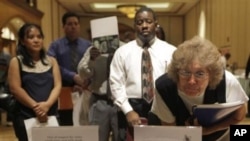Most of the 50 US states have struggled to close budget gaps by reducing public services, raising taxes or borrowing. A new study says Americans want leaner and more efficient government to deal with the budget crises. The survey shows that residents of five key US states share a sense of frustration and urgent desire to reform the budget process.
After the worst recession in 70 years and drastic drops in tax revenue, state governments are scrambling to balance their budgets. In California, lawmakers are working to close a 19 billion dollar shortfall. California governor Arnold Schwarzenegger last year imposed three-day-a-month furloughs on many state workers as a cost-cutting measure, and a court this week said that, despite a challenge by the workers, the measure is legal.
California was one of the five states in the survey, together with Arizona, Florida, Illinois and New York. Residents of each state face similar problems of high unemployment, a bleak real estate market and reduced tax revenues. Each has seen conflicting demands to raise taxes and save government programs, on one hand, or cut taxes and slash programs, on the other.
Susan Urahn of the Pew Center on the States says researchers see consistent responses from state to state on what the public wants. Four in ten respondents want smaller government, and even more are worried about waste.
"The real question is not how small or how large government ultimately should be, but how state leaders can demonstrate they are reducing waste, making government more efficient, and maximizing returns on taxpayer dollars," she said.
The survey shows that spending cuts are the most popular way to bring budgets under control. But a majority of respondents are willing to pay higher taxes to preserve elementary and high school education, and health services.
Urahn says that schools, health and social services are, in reality, the biggest recipients of state dollars, so that shielding them from cuts will be difficult.
Mark Baldassare of the Public Policy Institute of California says respondents resist public borrowing, the passing of debt to future generations.
"When it comes to how to close their state's budget gap, more than two thirds of residents in all five states pick spending cuts first," he said. "They prefer tax increases second, and then borrowing."
Voters would like to raise taxes on alcohol, cigarettes and gambling, and also raise corporate taxes. But Baldassare says revenue from these sources would do little to close huge budget gaps.
The analysts say the public has a sense of urgency, but is not fully aware of the trade-offs needed to balance a public budget. They say political leaders have a lot of work to do in educating the public about the tough choices they face.
The analysts say that after the election in November, at least half of US states will have first-term governors who will face competing demands from a skeptical public over taxes and spending, and a rigid bottom line in their state budgets.




